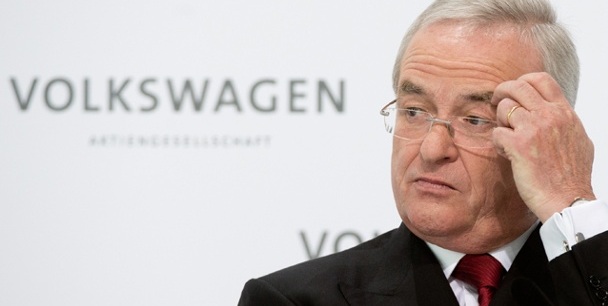The EPA said the auto maker admitted to rigging the emissions data, leaving it vulnerable to fines that could come to more than $18 billion. The company halted U.S. sales of popular diesel-powered cars and issued a sweeping apology for violating customers’ trust on Sunday.
The scandal triggered investor flight on both sides of the Atlantic: In Frankfurt, Volkswagen’s home-listing VOW3, -0.53% VOW, +0.70% VOW, -2.82% shares closed down 19% at €132.20 ($147.95), erasing €14.1 billion, or about $16 billion, in market value to €62.9 billion. Its U.S. listed stock VLKAY, -5.45% cratered 18% to $29.90 in midday trade.
Earlier in the year, the German-listed shares traded above €262, while the U.S.-listed shares had a closing peak of $52.50.
A near 20% plunge in a day is unusual for the shares of a German blue-chip company, as the German market is mostly institutionally driven.
Among the shares of other German stalwarts, the biggest-ever one-day percentage declines were 17% for Deutsche Post AG DPW, -0.61% and Siemens AG SIE, -0.62% SIEB, +1.71% 16% for Deutsche Bank DBK, -0.47% DB, +0.00% 15% for Daimler AG DAI, -0.42% and Deutsche Telekom AG DTE, -0.61% DTEA, +4.57% and 14% for Allianz SE ALV, -0.99% ALVA, +4.60%
For Volkswagen, the selloff for its non-voting preferred shares VOW3, -0.53% —the stock included in the DAX 30 index DAX, +2.77% —would be the second biggest on record, according to FactSet data.
The biggest decline in Volkswagen’s stock came on Nov. 3, 2008, in the midst of the financial crisis.
“Not only is this a black eye and a huge problem for Volkswagen, from an industry perspective it may set back diesel technology as a means for auto makers to reach the requirements for high fuel economy,” said Matt DeLorenzo, managing editor at Kelley Blue Book’s KBB.com, in a note.
“We may have reached a tipping point where now diesels will become more expensive to make than hybrids,” he said.
The “black eye” for Volkswagen also triggered a round of downgrades from analysts. At Kepler Cheuvreux, analysts slashed the rating to hold from buy and cut the target price to €185 from €255.
Equinet Bank called the situation a “major setback” for the company, downgrading its rating to reduce from neutral and lowering the target price to €145 from €180.
And at S&P Capital IQ, analysts cut the price target to €133 from €195 and lowered their 2015 full-year earnings per share estimate by 6% to €22.30.
More about:















































